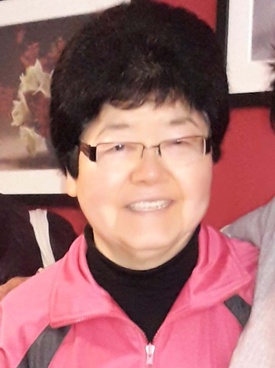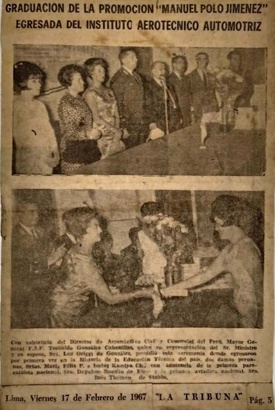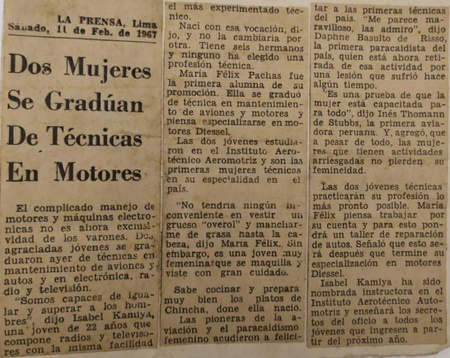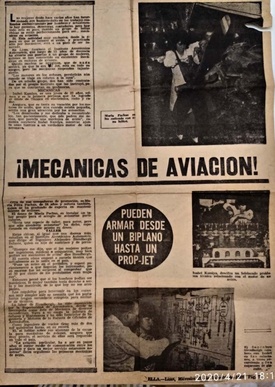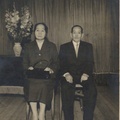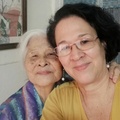When I started this chat interview with Isabel Kamiya, she told me the story of her family. I collected all the data, which was too much, so I decided to make a separate article about it. Everything revolved around her family and in the end I would do one about her, I thought it would be very easy. What I found was that if the family story was interesting, hers was also interesting and with many surprises, but very complicated, taking into account that much of what she told me could not be made public; things that were too personal, others were going to remove past stories that at this point, it would be better to leave them there, time will fix them or perhaps kamisama (God) with his divine justice.
Her name is Isabel, she was born in the Lima Maternity Hospital (emergency), the obstetrician asked her mother what name she would give her and she answered with a question—what is your name?, so that's where her name came from, He tells me that he was very lucky, imagine if his name was something else. Her parents called her by her Japanese name, Sakae, her brothers have always called her “chola”, the others always refer to her as Isabel, but the detail of it all was that they asked her mother for her name and That's how they registered her, as Isabel Chinen, while she observes that her other siblings registered as Kamiya Kamiya, without her mother's last name.
She studied her first years in a nihon gako (Japanese school), which her father had actually created for her and her brothers, in which some countrymen joined. Then he had to enter the “Peruvian school”, which was shocking for them, they knew a lot of mathematics, but in the other courses they were at a disadvantage, he studied at the Great Unidad Escolar Juana Alarco de Dammert, there he completed his secondary school. It turned out that Isabel was not as “calm” as she seemed at first, many anecdotes about children in addition to those from school, with her first meeting with the teacher on the first day. It was evident that the Japanese and their children were abused in different ways, in reality bullying already existed, only now it was given a name in English.
That is why among his stories he told us about Sensei Nagata, who was actually an expert in martial arts, he tells us that on one occasion he killed a donkey with a single blow, the problem came later, they wanted to imprison him for that; It was he who taught karate to his tall and strong nesan (elder sister) Julia Kazue. Some tricks could help you defend yourself in the gako (school) yard. He planted a tree where they practiced how to hit, there he taught karate, he had several students and all the brothers watched the classes attentively. One day he told them that their hands were a deadly weapon and taught them how to use them. They were very young, they had to walk alone, there was a lot of abuse, the law of the street is the strongest and they did not know how to defend themselves. As a child, her father made her a sling, it was shaped like a Y, so she could defend herself, especially from those who threw water on her during carnivals.
She says that once she defended herself with a clean slingshot, she had great aim, they never messed with her, her brother Santiago always reminds her that from her childhood until she was 15 years old she walked with her slingshot, she replies that it was until she was 9 years old. His father took the job of saving those duck eggs, those that did not hatch, which he called güero, but when they burst they “stinked like hell”; They used it to defend themselves from those who threw balloons at them and wanted to paint them.
In Venegas (a place in the Lima district of Barranco), at the end there was a dairy, so a truck passed by carrying those containers, the “lecheras”. There were some boys on the truck who were throwing the remains of these, so when they saw Isabel and her brothers on the road, they threw the remains of the milk at her. One day the sensei waited for the truck, saw it and stopped it, with one pull he tore off the door of the truck and told the driver that this is how his arm would be if he carried those boys on the truck. Then, at one point they met those same boys on the road, their nesan grabbed the biggest one, turned him around and put him on his back and slammed him against the wall, the others cornered themselves next to him and stood crying, never again They saw him again. While it is true that violence generates violence, there comes a time when one must defend oneself so as not to continue being abused.
She particularly remembers one school vacation, before starting the third year of high school, they had bought a typewriter at home, so her mother sent her to study typing and shorthand at the American Schools. Who thinks of sending students to study on vacation? Mom wanted her daughter to write correctly with a typewriter. When they returned from vacation, the compositions came and they explained in front of everyone how productive they had done during their break, “so I excelled,” he tells me, “no one had done anything like mine.” She renounced all vacations, but over time she felt grateful to her who always wanted her to learn something more.
After finishing high school, Isabel studied a technical career at the Instituto Aerotécnico Automotive, this was located on Canta Street, behind Iquitos Avenue, in La Victoria, where she graduated in Electronics, Radio and Television in 1967. In That opportunity, two women graduated in different careers from the institute, this fact caught the attention of many, even the media; That day, at graduation, she found out that she was the first woman to obtain a technical degree in Electronics, Radio and Television, so, the next day, she was in the newspapers. She was appointed as an instructor, so she worked for several years at the same institute.
Meanwhile, while in high school, he studied photography for three years at the National School of Graphic Arts, where he realized that it was his thing. He really liked photography, that is why, with the help of his father, after finishing, at the age of 25 he had his Photographic Studio in Jr. Tiravanti in Barranco. As a memory of his time at the institute, one day he told his father that the director of the Aerotechnical Institute invited him to lunch a lot, his father asked him a question, if the two of them went alone, he answered that he always did it with his son. , her father, who knew everything, told her “they're playing tricks on you with their son”, Isabel tells me: “at 23 years old, I was very slow, but only in that way.”
In the photography studio he developed everything he had learned, his nesan Julia Kazue helped him, first with customer service, then taking photographs. She became an expert, while Isabel dedicated herself to the laboratory, preparing the chemicals, developing, retouching, printing, enlarging and, in general, everything related to photos. One day, at the beginning, he remembers a grandmother who came as a client, she made him a particular request, that she wanted to appear in the photo without wrinkles, dark circles and moles. He took more than half an hour to retouch the negative, he removed her double chin and the wrinkles on her neck and in the process he lightened her eyes. When he handed her the photo, she was amazed and smiling, she said: "I'm so pretty," asking her several dozen of the same photo, including an enlargement.
Then, when he had more confidence, he confessed that that photo was prettier than the one he had at home and it was when he was twenty years old, so he recommended it to family and acquaintances. In this way, the name of her business “Foto Julissa” was born, where everyone knew that they were going to have light eyes, like the Mexican actress Julissa. Isabel describes herself as a person who has a lot of skill in drawing and a very good hand, photographic retouching is very easy for her, which is like, she says, “a cosmetic surgery”, I would add that she already did a Photoshop with the few tools he had.
He once had a promotion from the FAP, it was December 30, he had to wake up, it was even midnight on the new year, when he was revealing, he started the year with a good amount of okane (money), but he had to rest for two days, then he told himself that he was never going to expose his health, especially for the okane . It had incredible moments, like when it was changed to the three-body electoral booklet or the DNI, it was crazy, everyone had to change them, some dawn in between, as there was a deadline to change it. But he also had regular clients, such as those who had family portraits taken, those who wanted ID photos for school, and among his clients he also had many Nikkei who were neighbors in Barranco.
“In the photographic studio they robbed me several times, even with weapons, three armed men came in, it was the year 1982, instead of being scared, I was furious, a lot of contained anger, this lasted for several days, my head came to think horrible things about to what she would have done if she was armed. The other memory I have was one Sunday very early, Pedro Munetaka Ganaha came to my house.” I ask him if he was Professor Ganaha, to which he answers affirmatively and continues with his story. He told him that he passed by his study and had seen his door broken into, they went immediately. “Despite the theft, I fondly remember that detail of Pedrito's nobility, he passed by and came back to tell me, my gallery machine had been stolen. Thefts have always existed, only now we see them on television.”
After his mother died, many things happened, people who approached his father, who had other interests, encouraged him to sell a part of the land, in which he was scammed, until now he is seeing those problems. She reflects that her father did not deserve to die that way, everyone was independent, he did not lack anything, but she thinks that he was able to enjoy everything he had and it was not like that, also because of his character, he helped many people, he lent them okane , but they did not pay him back, he was even a guarantor in tanomoshi (joints or tambourine), which he finally ended up paying, because those he guaranteed did not honor their commitment. Even while her mother was still there, on one occasion she made a long list of people who owed them and never paid her. In Nihon (Japan) she had her parents' house, who died in the war, when her mother went to visit, she told the nephews who lived there that they could stay with her, that this was her husband's wish. Furthermore, that continues to be the thought of all the brothers.
She died on September 24, 1984 at the age of 76. The moment her father died was hard, but she assumed control, she was with her nesan Julia Kazue. Isabel dressed her father, she did it because she had the peace of mind to do it; her brothers working in the province, but could not be located, and the other sisters abroad. She did all the procedures alone, she remembers with nostalgia that she did not ask anyone for help, she had had a good campaign in the study for the change from the Electoral Booklet to the three-part one, she was capable of doing it. It was done in private, the main thing was that his father always told him that after he died, nothing mattered anymore, that all things were in life. He performed masses at home until he was 49 days old. Finally, he tells me that the people did not respond as much as he walked to each funeral, sukó (mass in the butsudan), and visits to the sick. At this point I reflect that many things that our parents and grandparents did, accompanying relatives and friends with solidarity, in difficult times, were not rewarded.
In 2011, her nesan Julia Kazue had a stroke, her right side became weak, being diabetic, she had to give her insulin three times a day, so the following year they had to close, so she began to dedicate more time to it. time to her sister, who when her mother died, took care of everyone at home, and also accompanied her throughout the time in the photography studio.
At one point his Nesan broke her hip, he took it calmly, took her to treat her, took care of her and then told his brothers. She has the quality of being calm in difficult moments, she preferred not to say anything to her brother who she could turn to, but he is very nervous, she recovered very quickly, after many therapies, she managed to walk alone. That same year, in January, at dawn, his Nesan got terrible colic due to intestinal obstruction, he stayed in the emergency room for four days, then he notified his brothers.
She died very recently, on March 1, 2020, she was already very weak, she couldn't eat, she was at home, that day was the first day, he went to see her in her room and she hadn't gotten up, she always did it at 6 am, he went to the garden to cut flowers to place them in the butsudan, when he returned he saw her with her eyes open, but she did not speak, she was already very weak, he felt that the end was near, he only squeezed her hands, they say that first he He loses his vision, then his speech, and finally he stops hearing. She tells me how lucky she is, in response to me telling her that I have a somewhat morbid interest in knowing if she said goodbye, I tell her that I feel empty because neither of my parents did it and it's something that I always carry with me. in my mind. He continued by telling me that he had already passed by his bedroom, at 1 am Isabel had fallen asleep watching television, he told him and his nesan replied that that was why he no longer watched television, because she would fall asleep anyway, he helped her get off the bed. bed and sat her on the portable toilet they had in her room and hugged her back to bed. At that moment he told her that she was no longer going to be able to get out of bed, so he responded that they would have to move her to the other room where they had a clinical bed.
She tells me “I was able to hug her in life and we talked.” Then, hours later, when she could no longer speak, he took her hands, asked her if she was listening and squeezed her hand, measured her blood pressure, it was the same as the day before, very low, told her not to be afraid, told her He spoke, she left calmly, seeing that he was no longer breathing, he continued talking to him, he knew that he was still there, he closed his eyes and only then told his brother. These moments came to mind when my mother passed away, she entered a state of unconsciousness, a kind of coma from which she would never wake up, they told us that we just had to wait, it seems that she waited for my sister and me to be there. (they are coincidences or things we would like to believe), because my older sister was in Nihon, we were there until, suddenly, when she was connected to a respirator, her chest no longer moved, the device that monitored her heart was just a line and an alarm sounded. I think about what Isabel told me, that the last thing they stop doing is listening, I think I should have spoken to her at that moment.
I apologize for the case, I am not a writer or journalist, I deviate a lot from the topics to get to the point again, but I could not help expressing what I feel when I write or listen to the stories and I want those who read me to also know laugh out loud or maybe shed a tear like I do now, the bad thing is that crying for any reason becomes very common.
Isabel considers herself very independent, she does not consult with anyone about what she is going to do, she just does it. That is why he dedicated himself to all the legal problems they had, both the arrangements of the papers that were incorrectly registered for each of his brothers, even in the property, a long path that continues until now. Throughout the entire conversation, I have so much confidence in her that I dare to ask, because it surprises me, why didn't she get married? She tells me “I had several lovers, several suitors, but I think I always fell in love with my head, surely if I had done it with my heart, I would have done it, plus I was used to doing what I wanted, without answering to anyone. ”. Surely in any case what would have happened would be that he would have had as many marriages as divorces due to his very independent nature.
An article is pending in which I will discuss the procedures that all the Nikkei made, for poorly registered papers, which in the case of the Kamiya family is a typical case of many in the colony, including my family.
© 2020 Roberto Oshiro Teruya


